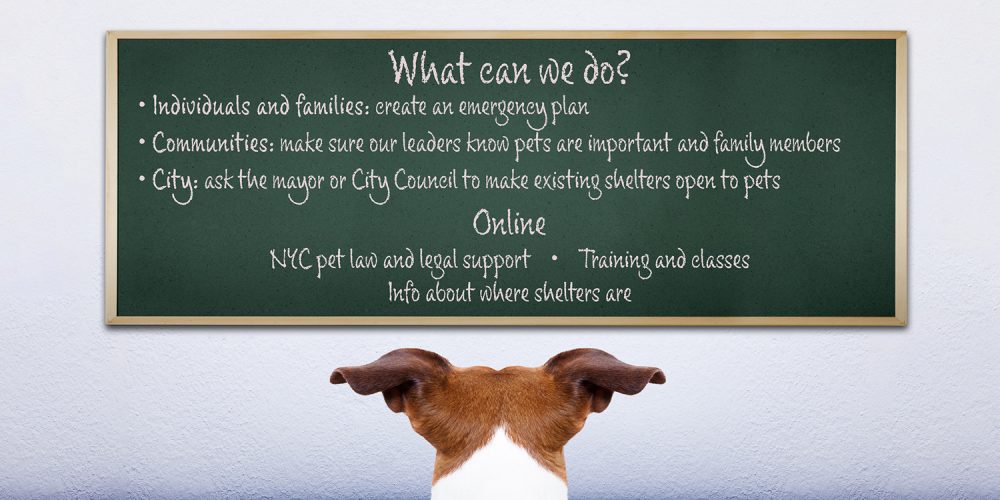
When a class of fifth grade students at the East Village Community School (EVCS) decided to focus their spring Service Learning Project (SLP) on the issues of pet abandonment and separation of pets from their owners, they reached out to the Mayor’s Alliance as a source of information.
The Service Learning Project of New York City is a civic engagement program for students in grades K-12. Through SLP’s day and after-school programs, students work together to help solve social problems of their choice, becoming active citizens in our communities.
Leah Elliott, who works with students at the school on East 12th Street in Manhattan, contacted the Alliance on behalf of the students and invited us to send a representative to speak with them as part their project’s research phase. Having learned about the innovative Helping Pets and People in Crisis Program (HPPC) created by the Alliance in 2006 and subsequently transferred to Animal Haven Shelter in 2019, the students wanted the opportunity to interact with an expert in the field.
“This decision was entirely student driven,” says Leah. “They are hoping to learn more about animal abandonment and to figure out how they can make a difference in this space.”
Jenny Coffey, a certified social worker, was our obvious choice to meet with the students. Jenny developed and managed the HPPC Program at the Alliance from 2007 until 2017, and then transitioned the program to Animal Haven, where she currently works. She enthusiastically agreed to accept the Alliance’s invitation to participate, and appeared in person before the class on May 3.
Jenny’s knowledge and years of experience seeking solutions to the myriad challenges that face pet owners dealing with homelessness, domestic violence, mental health challenges, and other personal setbacks provided the students with a rare opportunity to explore their chosen topic with a seasoned expert and pragmatic problem-solver.
“I was inspired to listen to the children talk about animal welfare and wanting to make a difference for the most vulnerable dogs, cats, and other pets,” says Jenny. “These are difficult concepts to learn, and I give each of these kids so much credit. Each child talked about wanting to help animals and alleviate suffering. Their engagement and their willingness to learn is really extraordinary. This program is great.”
The students were well prepared for their meeting with Jenny. They prepared and honed their questions in advance. They shared highlights of their research and listened and interacted professionally with Jenny throughout the discussion.
One student explained that the class chose to focus their SLP on the issue of pet abandonment in New York City because they care so much about animals. She said that many of the students have pets and they didn’t understand why anyone could abandon their pet.
“Before we started research,” she said, “we thought that this problem was because people are mean to their animals. Our research found there are many reasons.”
Another classmate picked up the discussion by identifying some of the reasons their research uncovered as to why people abandon pets. These include housing issues, such as people moving and not being able to take their pets with them, or people being evicted and not being able to take their pets to homeless shelters.
They cited other reasons for having to give up a pet, including costs of pet care, lack of understanding about how to care for a pet with health or behavioral issues, or an owner passing away or getting sick and not having a plan in place for their pets.
Jenny explained some of the gaps that exist in the City’s network of resources for people as well as pets. She also described some of the progress that has been made over the past few years with regard to accommodating pets with their owners in temporary and emergency housing.
The engaging session led to a discussion about specific actions the students can take to help create solutions and remove barriers to people remaining with their pets in times of crisis. One idea discussed involved encouraging families to have a plan in place to care for their pets during emergencies. Another was to make sure community leaders are aware that pets are part of the family and should be considered as such in instances of housing and shelter accommodations.
As the 45-minute discussion wrapped up, the students gave Jenny a round of applause and invited her to visit the class again. Now the students are working on a plan to transform their ideas into action.
The Alliance commends the students for their keen understanding of the importance of the human-animal bond and their dedication to working for change to benefit pets and the people who love them. Our hats are off to Jenny for sharing with the students her knowledge, experience, and valuable guidance.
We look forward to hearing more from the students as they continue their journey to create positive change!


